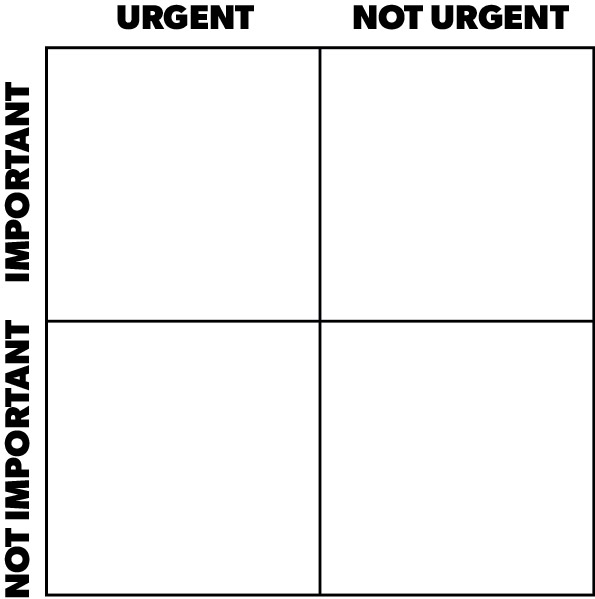12 Time-Management Tips to Improve Your Life
15 Min Read | Nov 4, 2024

Ever feel like you’re racing up the down escalator in life? You spend all day running and gunning and being busy—but you never seem to make real progress. It’s like there are never enough hours in the day to do everything on your list, so lots of things get done halfway—or worse: not at all. And it’s super frustrating! Am I right? Come on, I know you feel me on this.
We’re up against some serious time sucks and straight-up distractions in this crazy “hurry up” world. So even though we run around wearing busyness like a badge of honor, it’s really just a front if we aren’t actually making true progress. And as I’ve grown as a wife, mom and business owner, I’ve learned that when it comes to time management, I need to plan and protect my time at all costs if I want to truly be productive.
When we manage our time well—both at home and at work—we can drop the guilt about not getting everything done because we learn not everything is important. And even if it is important, we’ve already decided what our top priorities are going to be each day. We finally start spending our time on purpose.
Listen, this isn’t just about crossing more off the to-do list—it’s about choosing to prioritize your life in a way that moves the needle closer to your goals, and often times, this is a day-by-day decision. Time is the most precious resource you have, and if you don’t protect it, everything and everyone else will steal it.
What Is Time Management?
Time management is using your time wisely to do what is most important to you.
You might think time management is about getting the most done in the least amount of time. Or that it’s about getting done what everyone else needs from you. Or maybe time management isn’t even a concept to you because each day is just you flying from one task to the next. The true goal of time management is to spend more time doing what needs to get done most (and spending less time on distractions and people pleasing).
Lots of us know what we care about, but do we spend our time on those things? We say our family is our top priority, but we continue to work late nights and miss valuable time with them. We say we want to get in shape, but we don’t carve out time for healthy meal prep or exercise. The list goes on and on. Before we know it, we look up and feel like a slave to someone else’s schedule.
But the truth is, you get to decide how you spend your time. I know it may feel like your boss chooses—or your spouse, or your kids, or your church. Nope. You get to choose. The moment you realize you’re in charge of your time and your life is the moment you get your power back.
The Benefits of Time Management
Time management is important because, if we’re not careful, we can end up going from one type of busyness to another. By trying to do too much, we end up not doing much of what actually matters. And that simply is not it.
Here are some benefits of time management:
Increased Productivity
Time management isn’t just about boosting your productivity, but when you manage your time well, you’ll be more productive! You’ll spend less time on busywork and more time on the things that are important. And here’s a tip: Identify your most focused and energized times of the day and schedule your most important to-dos during that time. Your productivity will shoot through the roof. That’s what I’m talking about!
Less Stress
Chasing a finish line that’s always moving gets pretty exhausting. Being stretched thin, scattered and rushed adds a lot of unnecessary stress to your life. Your mental, physical, emotional and spiritual health will all take a hit. And if you’re not careful, all that chaos can lead to burnout.
Want to build a non-anxious life? Learn how in Dr. John Delony’s new book.
On the flip side, managing your time well and having a clear expectation of what is time well spent actually lowers stress. You’ll focus your energy and be able to clearly see at the end of each day all that you’ve accomplished.
More Joy
When you manage your time wisely, you can focus on the present moment and enjoy it. If you’re always distracted by where you’re not, you miss out on the here and now. When you’re at work, be at work. When you’re on the phone with your BFF, be dialed in. Wherever you are, be all there. You’ll be spending your time on what’s important to you, and you’ll actually get to enjoy the experience.
12 Time-Management Tips to Improve Your Life
So, I’m sure you want to live a more productive and low-stress life. But how do you actually get there? Here are 12 time-management tips to help you spend your time doing what’s most important to you.
1. Do a time audit.
The problem isn’t how much time you have. We all have 24 hours in a day. The problem is how you use it.
To figure out where your time goes, you’ll need to do a time audit. This means keeping a log of what you do every day and how much time you spend on each thing. It might take a few days of keeping track to get a good picture of where your minutes and hours go. And make sure to be detailed and even include things like commutes—you might be surprised at how you multitask during certain time chunks. Maybe that commute is also your daily call to dear old Dad.
And if you’re like me, you’ll probably find some surprises. (Do I really spend 30 minutes browsing Netflix for the right show?)
2. Identify your distractions.
After you do your audit, you need to pinpoint the distractions and time traps that knock you off course. A time trap is something that steals time from you.
Maybe it’s scrolling social media or binge-watching Netflix. Maybe it’s a weekly meeting that has nothing to do with your job. Maybe you get bogged down solving coworkers’ problems—and then you don’t have time for your own!
When you know which activities waste your time, you can protect yourself from them. You’ll know what to say no to so you can say yes to more important things.
3. Figure out what’s most important to you.
For most of us, the problem isn’t that we’re not doing enough—it’s that we’re doing the most. Sit down and figure out what’s really important to you. This could be simple daily habits—or larger weekly or monthly goals. One thing I do at the start of each year is make a list of five nonnegotiable values. Having this list is like a filter for how I prioritize my day. So if I’m ever feeling crunched for time or frustrated by my schedule, I can use that set of values to get rid of “obligations” that don’t line up. Sorry, neighbor’s birthday party, you just got voted out.
Focus your time, energy and resources on what’s most important to you. Author Patrick Lencioni says, “If everything is important, then nothing is.” Your time is limited, so decide what makes the cut and what doesn’t.
4. Identify your priorities.
A lot of things are important. But not all things are urgent. The next step is to figure out which important things need to happen first and create a list of them in order of priority. Then schedule your time that way. Having a clear plan allows you to stay focused and keep less important tasks from distracting you from the main thing.
Luckily, there’s an easy way to figure out what task is a priority and what you can get to later. Everything you want or need to do falls into one of these four categories:
- Important and urgent
- Important but not urgent
- Not important but urgent
- Not important and not urgent

Look at the chart and figure out where the tasks on your time audit fall. Obviously, things that are both important and urgent should be your top priority.
My boss, Dave Ramsey, likes to call his top daily priority his A1 (like the steak sauce). He focuses on A1 first and then works on A2, A3, etc. If a less important task pops up—something that could be categorized as a B or C priority—he knows it’s a distraction that can be handled later or by someone else.
5. Schedule your priorities.
Once you know your top priorities, put them on your calendar first. Here are a few examples:
- If you want to grow in your current role at work, schedule time to study and learn. Sign up for an online class or meet with a mentor and block out time to get it done.
- If you have a work project due, put time on your calendar to work on it.
- If you want to have a better relationship with your spouse, schedule a regular date night and commit to it. (Add a line item to your budget, too, so you’re not looking in the couch cushions for cash to pay the sitter!)
Figuring out how to fit everything into 24 hours reminds me of how I feel when I’m packing for a trip. If I stuff my suitcase with too many clothes and shoes, I won’t get it closed (even if I sit on it!). Something has to go or my clothes will end up wrinkled and my shoes will get crushed.
Sometimes we do that with our calendars. We cram in so much that the quality of what we are doing goes down. We aren’t truly giving our best effort—just checking a box. But the reality is, time management is about choosing what’s most important and being willing to skip what’s not important in order to increase the quality and fruitfulness of our time.
6. Focus on one task at a time.
Multitasking is a myth in many cases. Especially if you’re trying to multitask two active tasks. Have you ever tried to talk to someone while they’re texting? They aren’t listening. They can’t actively listen and actively write! When we do too many things at once, we do a bad job on all of them. In most cases, it’s better to focus on one thing at a time.
You have to be intentional about your focus. In his book Deep Work, Cal Newport says, “Who you are, what you think, feel, and do, what you love—is the sum of what you focus on.”
If your attention is scattered, you’ll feel scattered. If you focus on the mile-long list of things you haven’t finished, you’ll feel overwhelmed and frustrated. Instead, let yourself focus on one thing at a time. Then watch how your output increases and your stress decreases. Now that’s a win!
7. Set boundaries.
When you schedule your time and set boundaries around it, you’ll spend it more mindfully. Your work will turn out better when you give it a clear start and end time.
And when I say boundaries, I don’t mean loosey-goosey suggestions! If you put “work on presentation” on your calendar from 9 to 11 a.m., then that’s what you do from 9 to 11! Don’t dillydally on Instagram or take a snack break. That can wait.
Here’s an example to show you what I mean. Microsoft did an experiment in one of its offices in Japan. They let employees take off every Friday for a month, and during that time, they saw a 40% boost in productivity—even with the extra day off!1 The workers actually got more done in less time.
I’ve even seen this in my own life. I can do my makeup in 10 minutes. But if I give myself an unset amount of time, I somehow expand the same 10-minute routine into 40 minutes. Mind bending.
The lesson here is that work will take as long as the time you give it. Boundaries will help you do what you need to in the time you have.
8. Practice saying no.
No is a powerful word. We talked about this before. You need to practice saying no to the things that steal your time or don’t match up with your goals. And I mean actually saying no—like, “No, I can’t take on this extra project”—because it’s important for you to be home to spend time with your kids. I said it before and I’ll say it again: If you don’t protect your time, everything and everyone else will steal it. If you want your time back, you have to open your mouth and take it.
Say it out loud and practice in front of your mirror or dog or therapist. Because the truth is, you don’t have to sign up for every volunteer opportunity or grab coffee with a friend every day of the week.
Saying no to time traps will free you up to say yes to what really matters.
9. Give yourself realistic time limits and don’t rush.
We decide what goes on our calendar and how much time we give to it, so we shouldn’t be surprised when our schedule’s overstuffed (just like that suitcase). If you think a task is going to take 30 minutes, don’t schedule 25 minutes and hope you hit every green light on the way. Give yourself a little extra time. And be sure to build a buffer or transition into your schedule to keep you from rushing, because shifting tasks takes a minute, and let’s face it—we all need time to pee.
Rushing is a choice. So what will you choose? Will you be busy, burned out and running ragged? Or will you be peaceful, calm and flexible? Rushing is a state of mind just as much as it is a state of our schedule.
10. Recognize the season of life you’re in.
We want to do it all, be it all, and have it all—all the time. But Lord knows one of the secrets of time management is understanding that life comes in seasons. What’s most important to you when you’re building your career will be different from when you’re a new parent or a retired grandparent.
Just because something doesn’t make the cut in this season of life doesn’t mean it never will. It just means you know what’s best for where you are in this stage of life. If you’re about to get a promotion at work, you know it probably isn’t the best time to coach your son’s little league team.
When you’re making room and committing to something new, let yourself take something else off your plate. Everything is temporary, so be present and enjoy where you are.
11. Make room for rest.
Rest is one of the most underrated and necessary parts of life. When you’re running all day every day, you wear down your ability to be productive and focused when it actually counts.
After a few hours of heads-down work, power all the way down and take a full break. Go for a walk. Meditate for 10 minutes. And when you get home from work, be with your family or friends and refuse to sneak a peek at your emails or worry about the big project due at the end of the week. By setting boundaries and prioritizing rest, you’ll get more done when you’re at work.
And do the same thing at home. If you plan to rest when everything around the house is done—the pile of laundry or dishes—you’ll never get to rest because it’s never all done. Go to bed early, take a nap, and rest when it’s time to rest—then watch how this improves every other area of your life.
12. Don’t compare your time to someone else’s time.
I used to hear the adage that we all have the same 24 hours. And I’d look around at the people in my life thinking, If they’re doing that with their time, I need to be doing that.
But then I realized how time can be different. Three hours at home as a stay-at-home mom with two babies is not the same as three hours with a live-in nanny. Eight hours working from home running your own online business is not the same as eight hours working at a factory where you clock in and out.
Your time is your time. It’s not better or worse, and it’s certainly not to be compared to someone else’s time.
Find Peace in Chaos
As you can tell, I’m passionate about time management. I believe it’s an incredibly important part of living a fulfilling, purposeful and enjoyable life.
If time management, or lack of it, has you feeling anxious, check out the latest book by my friend and colleague Dr. John Delony, Building a Non-Anxious Life. It will help you find peace in chaos by looking at the Six Daily Choices you must make to have a non-anxious life.



